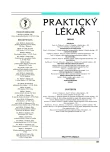-
Medical journals
- Career
Delirium treated at a gerontopsychiatric ward for acute cases
Authors: T. Turek
Authors‘ workplace: Psychiatrická léčebna Bohnice, Praha, ředitel MUDr. Z. Bašný
Published in: Prakt. Lék. 2005; 85(7): 394-397
Category: Of different specialties
Overview
Delirium, a delirious state, is a serious pathological condition with high mortality. With progressin age its incidence increases in gerontopsychiatry. In question is aqualitative disorder of consciousness manifesting a varying clinical picture. Delirium is a non-specific organic psychic syndrome characterized simultaneously by disorders of consciousness and of attention, perception, thinking, emotion, psychomotorics, behavior, and the sleep and vigilance cycle. Early diagnosis and treatment improve the overall prognosis in the patient.
The delirious condition is indicated for acute hospitalization within the framework of non-voluntary hospitalization. The patient is dangerous to him/herself and surroundings in a concrete and immediate way.Key words:
delirium – dementia – gerontopsychiatry – co-morbidity – psychopharmaceutics.
Labels
General practitioner for children and adolescents General practitioner for adults
Article was published inGeneral Practitioner

2005 Issue 7-
All articles in this issue
- Q fever – clinical picture
- Q fever: properties of the agent
- Molecular methods in cytogenetic investigations in clinical oncology
- How willing are patients to comply with regimen measures?
- Delirium treated at a gerontopsychiatric ward for acute cases
- Horner’s syndrom: Topical diagnostics of the causative lesion (three case reports)
- Lemierr’s syndrome
- The general practitioner in the eyes of his patient: Interpretation of the results of an empirical survey
- Respecting previously expressed wishes of the patient
- Risks and expectations in health care
- General Practitioner
- Journal archive
- Current issue
- Online only
- About the journal
Most read in this issue- Lemierr’s syndrome
- Horner’s syndrom: Topical diagnostics of the causative lesion (three case reports)
- Q fever: properties of the agent
- Q fever – clinical picture
Login#ADS_BOTTOM_SCRIPTS#Forgotten passwordEnter the email address that you registered with. We will send you instructions on how to set a new password.
- Career

